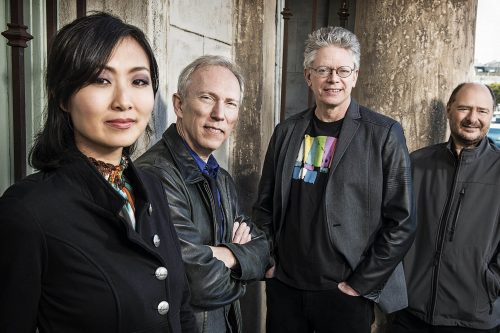
Despite the name, classical music can be old and new, and there’s some of both coming to town this month.
The Eugene Symphony’s season-opening concert Thursday, Sept. 22, at the Hult Center squarely fits the old music paradigm. Brahms’s powerful fourth and final symphony ranks up near the top of any list of orchestral classics, and his friend Robert Schumann’s Cello Concerto (starring the nationally renowned young Seattle cellist Joshua Roman, who spends much of his time play ing far hipper music than this) maintains the German paleo-Romantic vibe, with early modernist composer Anton Webern’s Passacaglia being the baby of the bunch at merely a little more than a century old.
Similarly, the Emerson Quartet, often regarded as one of America’s most technically accomplished chamber ensembles, perform a pair of history’s most beautiful string quartets Oct. 2 at the UO’s Beall Hall. Claude Debussy’s trailblazing impressionistic 1893 quartet clearly influenced the even more ravishing quartet his younger compatriot Maurice Ravel wrote a decade later. While the Emerson Quartet’s steely approach to French repertoire can lack a certain joie de vivre, they’ll still demonstrate how music more than a century old can still delight 21st-century listeners. The concert also includes Norwegian composer Edvard Grieg’s 1878 quartet, which some claim might have influenced Debussy’s.
The Oregon Bach Collegium’s Sept. 25 concert at United Lutheran Church (22nd and Washington) goes back even farther in time, to rarely heard early 17th-century German music for voices, organ and Baroque trombones.
What the Emersons are to old music, Kronos Quartet is to new. For more than four decades the San Francisco-based string foursome has set the pace for new music played on old instruments, as well as newer instruments including electronic gear. They’ve also commissioned a tremendous body of new music, including compositions by young emerging composers. The top “classical” recommendation this month, Kronos Quartet’s annual Oregon visit lands Oct. 2 at Corvallis’s LaSells Stewart Center, and string-quartet fanatics can probably just make it there by the 7 pm start if you leave right after the 3 pm Emerson show at Beall lets out.
The Kronos performance features music from the wild and sometimes wacky Stanford prof Mark Applebaum as well as John Oswald, Garth Knox and Aleksandra Vrebalov, plus Mary Kouyoumdjian’s ferocious Bombs of Beirut, which uses recorded voices of her family’s civil war survivors. They’ll also play music by the great 20th-century Polish composer Krzysztof Penderecki, one of America’s finest living composers, along with works by California’s Terry Riley and a spiffy new string quartet arrangement of The Who’s “Baba O’Riley,” which I heard the group premiere at Riley’s 80th birthday celebration in San Francisco last summer.
Kronos doesn’t ignore pop culture, since they’ll also be playing another rock-tinged piece, Sigur Ros’s mysterious “Flugufrelsarinn (The Fly Freer),” a Cafe Tacuba piece arranged by the fine Argentine-American composer Osvaldo Golijov, and even a modern raga.
Speaking of world music, Oregon koto master Mitsuki Dazai joins Ashland-based, New Zealand-born flutist Tessa Brinckman in a program of poetry and music by American (including Oregon) and Japanese composers and poets Oct. 1 at Broadway House Concert (911 W. Broadway; call 541-686-9270 for reservations). I heard them play this music in Beaverton last spring and found it consistently fascinating.
Another recommended world music concert happens Thursday, Sept. 22, at Tsunami Books, when one of the great Celtic bands, Tannahill Weavers, plays traditional Scottish music. And though the Rio Olympics are over, there are two opportunities to hear Brazilian music: On Sept. 25, Brazilian lyric soprano Márcia Guimarães joins Eugene pianist Julia Brown in a free afternoon concert of Brazilian art songs at First United Methodist Church (1376 Olive). And on Oct. 1, contemporary Rio and New York-based diva Bebel Gilberto brings her dreamy pop electronica, fueled by Brazilian beats, to the Hult Center’s Soreng Theater.